
The following are projects by the Center for Applied Anthropology (CfAA) at Northern Kentucky University (NKU).
This project, in collaboration with the Vice President and Chief Strategy Officer at NKU, is to discover the shared cultural model of social distancing among NKU students during the COVID-19 Pandemic. More specifically, both the students' ideas about the places that they spent their time as well as the activities that they did in those places will be collected and analyzed to discover if they are shared among NKU students. The first phase of this project occured during the fall 2021 semester with approximately 40 students from ANT 275 Language & Culture and ANT 342 Quantitative Methods in Anthropology, the second phase during the fall 2022 semester with approximately 35 students from ANT 275 Language & Culture.
In Spring 2021, Professor Lott and students in Applied Anthropology (ANT 325) partnered with the Scripps-Howard Center to collect community feedback on a plan for eco-friendly improvements to Bernadette Watkins Park in the west side of Newport, Kentucky. Our primary method of data collection was an electronic survey (due to the COVID-19 pandemic), and we worked ReNewport and the Westside Citizen’s Coalition to deepen our understanding of the community and to reach community members. The survey asked participants to give feedback on a student-produced
diagram of the proposed changes to the park as well as how they use parks and what they would like to see in parks in the future.
Based on our analysis of community feedback (see report linked below), a bioswale and trees were installed in the park. The trees provide a barrier between the park and a busy road; the bioswale filters rain water and directs runoff to a storm drain, to help reduce street flooding. In Summer 2022, Professor Lott collaborated with the Scrips-Howard Center to plan a celebration in the park for community residents. Professor Lott and 3 former NKU anthropology students attended the event to educate community members about the bioswale in their park. Community volunteers pitched in to reinforce the bioswale, as well. The bioswale demonstration is available here: https://youtu.be/Ut1HrVAB7ds.
The data from this project has produced a report for the City of Newport about resident feedback on the eco-friendly park plan. Another report discussing what residents of Newport want to see in parks is in preparation.
Lott, Jessica. 2021. "First Report of the Bernadette Watkins Park Feedback Project: Community Feedback." Highland Heights: Center for Applied Anthropology, Northern Kentucky University.
In Spring 2021, students in Historical Archaeology (ANT 336), conducted research into primary documents exploring the institution of slavery in Northern Kentucky. They delved into topics including African American education, slave patrols and runaway slaves, manumissions, the Freedmen Bureau, newspaper ads related to slaves and slavery, and some notable slave owners in Northern Kentucky. The data from this project will be collated and shared with the City of Newport, the Historical Societies of Campbell and Kenton counties, as well as the Newport History Museum at the Southgate Street School. Based on their preliminary research, the students made suggestions for the continuation of the project for future archaeology classes.
This applied research project, in collaboration with the Dean of the College of Arts and Sciences at NKU, evaluates definitions of "community" among faculty, students, and staff of NKU. During phase one (spring 2015), approximately 12 students in Anthropology 325 (Applied Anthropology) conducted ethnographic interviews to explore how people define community. The results of this project will be published on http://cfaa.nku.edu, journals and conference proceedings as well as a report to the Dean. It is hoped that the results of this research will assist the Dean in directing the college to better meet the needs of the community.
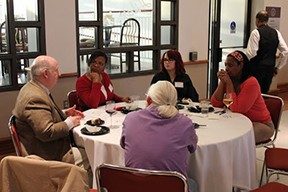
This community-based research project, in collaboration with the Brighton Center, evaluates definitions of "hope" in West Newport, Kentucky.
During the first phase of this project (spring 2013), approximately 15 students in Anthropology 325 (Applied Anthropology) conducted ethnographic interviews to explore how people define hope.
During the second phase (spring 2014), approximately 12 students in Anthropology 325 (Applied Anthropology) conducted ethnographic interviews with community members of Newport, Kentucky.
The results of this project will be published on http://cfaa.nku.edu, journals and conference proceedings as well as a report to the Brighton Center. It is hoped that the results of this research will assist the Brighton Center in constructing community development programs in West Newport.
This project investigates the obstacles students face on their path to graduation at Northern Kentucky University (NKU). This research is being conducted in collaboration with the FEED Quality and Completion Initiative at NKU. During the first phase (spring 2014), ethnographic interviews with be completed with over two hundred undergraduate students, eliciting propositional statements of barriers to graduation. In the second phase (spring 2014), the shared statements were then used to create a questionnaire, which was given to several hundred undergraduate students to discover how the cultural model of obstacles to completing an undergraduate degree was shared at NKU.
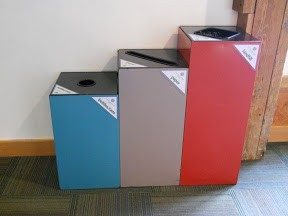
In collaboration with Northern Kentucky University, SfAA is conducting a study of how students use the combination recycling containers situated throughout the campus. In a pilot study during the fall 2010 and spring 2011 semesters, patterns of successful container use were effected by the type of container used (three bin versus four bin containers) and sex of the students.
The results of this project will be published on the Internet (http://cfaa.nku.edu), journals and conference proceedings as well as a report to Northern Kentucky University. It is hoped that the results of this research will assist Northern Kentucky University in determining the best use of combination recycling containers on campus.
This community-based research project, in collaboration with the Boone, Campbell, and Kenton County Conservation Districts, evaluated folk knowledge of invasive plants among land owners in Boone, Campbell, and Kenton Counties, Kentucky.
During phase one (spring 2011), approximately 25 students in Anthropology 325 (Applied Anthropology) interviewed 62 farmland owners, collecting data on their folk knowledge of invasive plants and management methods.
In the second phase of this research (spring 2012), Dr. Douglas Hume analyzed the data collected by the students and created a questionnaire, which was mailed to 2,225 farm land owners in Boone, Campbell and Kenton Counties. In the questionnaires, participants were asked identify which management methods they used for specific invasive plants. The questionnaire was sent again, in the Conservation Districts' newsletter, Landscapes, in February 2013.
Hume, Douglas W. 2014. “Weed Mitigation Knowledge Among Northern Kentucky Farmland Owners.” Highland Heights: Center for Applied Anthropology, Northern Kentucky University. https://doi.org/10.13140/RG.2.2.26182.60489. [Cite, Download]
The Center for Applied Anthropology (CfAA) at Northern Kentucky University (NKU), in collaboration with the Parks and Recreation Board of Highland Heights, Kentucky, completed an investigation into the cultural models of recreation in Highland Heights.
The purpose of this community-based research project was to document how residents of Highland Heights and faculty, students and staff at NKU, thought about and had preferences for different types of recreation. In particular, we asked informants about their knowledge of the types of recreation and in what types of recreation they would most likely participate.
During this research (fall 2011 to summer 2012), 75 students in three courses and one independent study (complete list of students is included after the Findings), conducted ethnographic interviews with 253 residents of Highland Heights and faculty, students and staff at NKU as well as completing preliminary analyses of the collected data.
During interviews, participants were asked to list types of recreation, sort types of recreation into categories, confirm categories and types of recreation, and select types of recreation in which they would most likely participate. We found that residents of Highland Heights and faculty, students and staff at NKU have a wide knowledge of the types of recreation and varied interests, but there are several types of recreation that are more commonly reported as being of interest.
Hume, Douglas W. 2013. “What Is Recreation? Community Opinions in Highland Heights, Kentucky.” Highland Heights: Center for Applied Anthropology, Northern Kentucky University. https://doi.org/10.13140/RG.2.2.17374.56643. [Cite, Download]
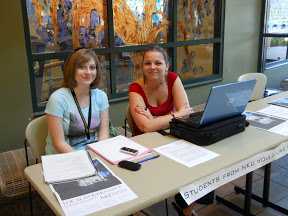
The Applied Environmental Anthropology Research Group (AEARG) at Northern Kentucky University (NKU), in collaboration with the Kenton County Governance Study, completed a preliminary investigate into the cultural models of local governance in response to the Northern Kentucky Forum that took place April 24, 2010.
The purpose of this service-learning research project was to document how residents of Kenton County, Kentucky, understand the cooperation between local and county governments. In particular, Kenton County residents’ knowledge of the parts of local governance and the relationship of these parts to each other was collected.
During this research (spring 2011), 11 students in the Anthropology 100H, Honors Introduction to Cultural Anthropology, conducted ethnographic interviews with 98 Kenton County residents at Northern Kentucky University and public libraries in Kenton County. During interviews, participants were asked to describe the parts of local government and the relationship between these parts. We found that residents of Kenton County have only limited knowledge about their local government.
Hume, Douglas W. 2012. “Local Governance in Kenton County, Kentucky.” Highland Heights: Applied Environmental Anthropology Research Group, Northern Kentucky University. https://doi.org/10.13140/RG.2.2.27440.89606. [Cite, Download]
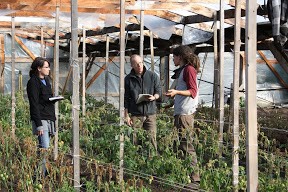
This community-based research project investigated the effects of natural disasters on farm laborers in and around San Luis Obispo, California, through ethnographic research. The main questions that this research hoped to answer included:
Dr. Douglas Hume lead six undergraduate anthropology students from NKU to farming communities in and around San Luis Obispo during the winter intersession of 2009-10 as part of a Learn and Serve America Grant. From the second session of the fall 2009 semester until the end of the spring 2010 semester, students learned ethnographic interview methods, interviewed farmer laborers, analyzed ethnographic data, and jointly wrote a report documenting our findings:
Hume, Douglas W., Brandy Blust, Matthew Buttacavoli, Timothy Carpenter, Emila Halilovic, Kevin Talbert, and Michael Washburn. 2010. “Effects of Natural Disasters on Farms in the San Luis Obispo Region, California: A Service-Learning Project.” Highland Heights: Applied Environmental Anthropology Research Group, Northern Kentucky University. https://doi.org/10.13140/RG.2.2.14857.98400. [Cite, Download]
In June 2010, Michael Washburn completed a service-learning independent study project mentored by Douglas Hume, Ph.D., to conduct ethnographic research on ecotourism at Big Bone Lick State Park.
The final report below documents Washburn's ethnographic research project on ecotourism from June 2009 to June 2010:
Washburn, Michael, and Douglas W. Hume. 2010. “Ecotourism at Big Bone Lick State Park, Kentucky: A Service-Learning Project.” Highland Heights: Applied Environmental Anthropology Research Group, Northern Kentucky University. https://doi.org/10.13140/RG.2.2.32474.06082. [Cite, Download]
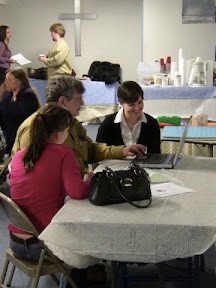
As part of Anthropology 325 (Applied Anthropology, Spring 2009) and 499 (Independent Study, Summer and Fall 2009), students interviewed local community members of the Hawthorne Crossing Conservation Area, Campbell County, as a service learning component of the course.
The service learning project was in partnership with the Campbell County Conservation District, Kentucky. Community members that agreed to participate were asked about the history of the conservation area and their own expectations of what future conservation projects at Hawthorne Crossing should entail.
This information will now be used by the Campbell County Conservation District to document the site and also to create a management plan for the area. In addition to the needs of the conservation district, this project was designed to introduce students to basic applied anthropological research (e.g., interviewing and analyzing qualitative data) and promote service to the local community.
Hume, Douglas W. 2009. “Hawthorne Crossing Conservation Area Final Report.” Highland Heights: Applied Environmental Anthropology Research Group, Northern Kentucky University. https://doi.org/10.13140/RG.2.2.29957.47841. [Cite, Download]
News items about this project: